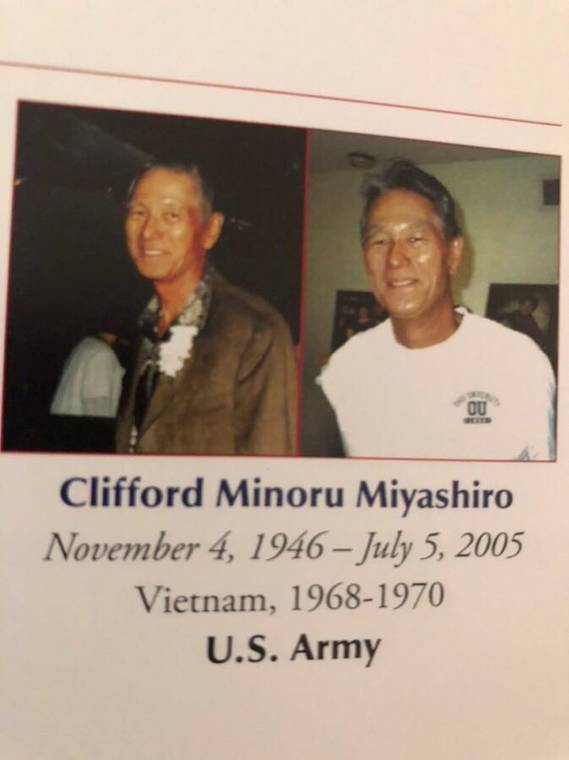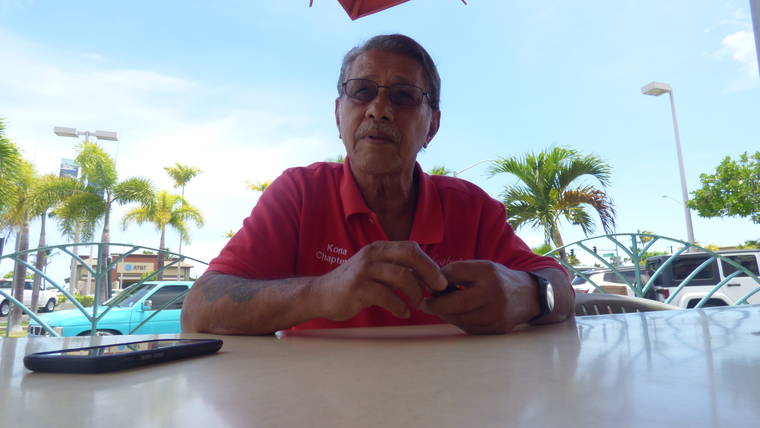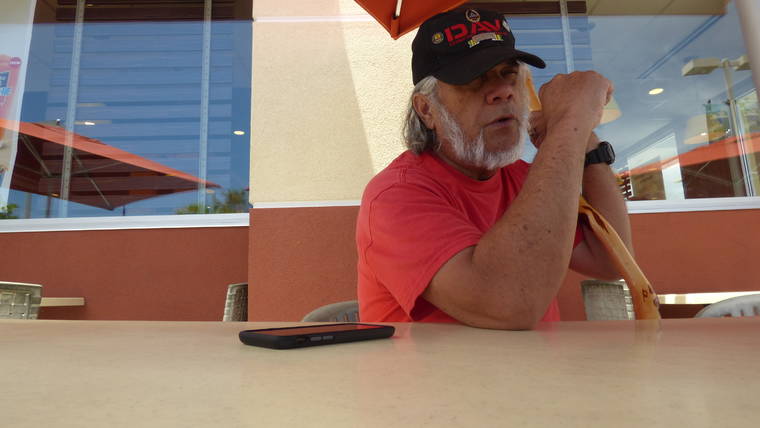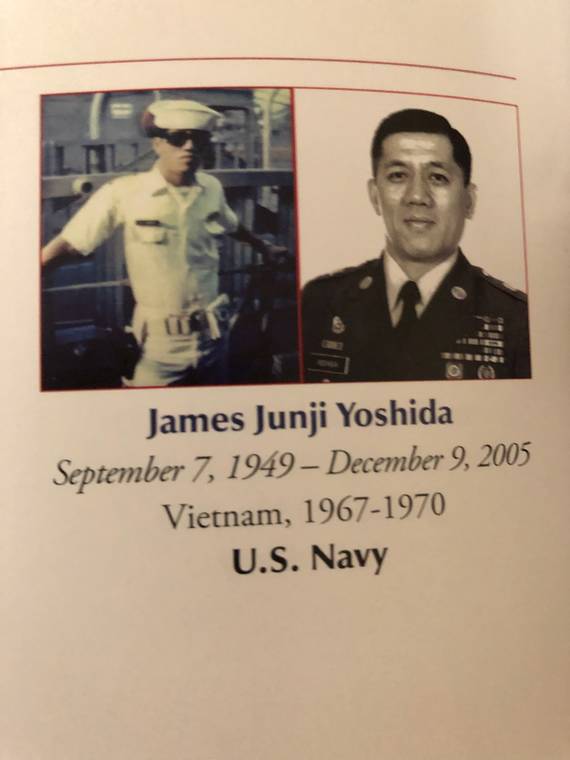Honor roll: Big Islander among hundreds of Vietnam veterans honored by ‘In Memory’ program
KAILUA-KONA — The Vietnam War was a nightmare, and most people would agree on that.
The Vietnam Veterans Memorial Fund hosted a day of observance on June 15 in Washington, D.C, honoring those that served in the war and later died from ailments related to their service. The organization started a program in 1993 called “In Memory,” dedicated to the veterans that died from conditions such as Agent Orange exposure, cancer, PTSD, suicide and many others.
Approximately 543 Vietnam veterans were inducted in this year’s “In Memory” ceremony, including four men from Hawaii. This included James Junji Yoshida from the Big Island, Benjamin Villegas from Maui and Clifford Minoru Miyashiro and Cyril Pahinui, Hawaii’s nationally renowned guitarist, from Honolulu.
“It is a great way to honor those men and women because they were treated so badly when they came home,” said Yoshida’s widow, Mary Yoshida. “Now to be honored in a way like this is a wonderful thing.”
The effects of the war carried over to many, including friends and family of those that served. The veterans that came home still fought wars of their own that impacted their daily lives. Whether it is cancer, PTSD, suicide or Agent Orange exposure, there can be no question that Vietnam caused decades of suffering.
“A lot of my friends suffered from Agent Orange exposure,” said U.S. Navy Petty Officer Tony Bergoli. “I had a friend in the Air Force that passed away a couple years ago that suffered because of it … . His body just deteriorated. He went blind, his heart gave out, he had diabetes and he had to go through dialysis three to four times a week. I still have friends that go through this today.”
Mistreatment
James Yoshida, a U.S. Army and Navy veteran from Naalehu who served on the USS Saint Paul and one of this year’s In Memory inductees, committed suicide in 2005 after battling the effects of the war for years.
“He was very proud to be a member of the service,” said Yoshida’s widow, Mary Yoshida. “But he suffered greatly when he returned. He was spat on by people.”
Mistreatment of Vietnam veterans was not unheard of. Peace signs were returned with middle fingers, cars were egged and veterans, such as Yoshida, were spat on.
“I was drafted, sent to fight in the war and then I was labelled as a villain,” said Staff Sgt. Charles Sermon. “We were seen as the ones doing something wrong. That is how we were treated.”
The mistreatment deeply impacted many of Vietnam’s veterans, including Staff Sgt. James Patao.
“It made me feel lonely,” Patao said. “It made me feel like nobody gave a damn about what we did. We did not get any kind of celebration when we got back.”
While mistreatment did exist, Patao said that there is one thing that civilians do that makes a difference.
“You know what makes me feel proud about my service? When young men like that say ‘Thank you for your service,’” Patao said while gesturing to a boy no older than 10. “I was stand standing right here and a young man passed me and told me, ‘Thank you for your service.’ It made me feel really good.”
Mental health
In 1980, five years after the end of the Vietnam War, PTSD, or post-traumatic stress disorder, was officially recognized as a mental health condition. According to the 1983 National Vietnam Veterans Readjustment Study, it was determined that around 15% of male veterans and 9% of female veterans struggled with PTSD. It is believed that around 30% of male Vietnam veterans and 27% of female Vietnam veterans have struggled with the illness at some point in their lives.
“I want people that served in Vietnam that have difficulties in their daily lives to go seek help,” said Army Sgt. Leabert Manuel. “Back in the ‘70s, we did not have a vet clinic. We did not have one until the late 80s. There are a lot of Vietnam veterans out in the middle of nowhere here that are hesitant to come out and get help … . It took me more than 20 years to seek treatment.”
Steps are being taken by both the U.S. Department of Veterans Affairs and the Trump administration to prevent suicides among veteran communities and raise awareness. In 2018, the VA spent $12.2 million on suicide prevention outreach as well as $1.5 million on paid media.
The VA and the Department of Health and Human Services’ Substance Abuse and Mental Health Services Administration (SAMHSA) established the Mayor’s Challenge, which utilizes a thorough public health approach to suicide prevention. The VA also started the #BeThere Campaign to raise awareness and has worked under President Trump’s Executive Order 13822. This executive order is designed to provide veterans with access to top-notch mental health care as well as suicide prevention resources as they transition from uniformed service to civilian life.
The Trump administration took additional steps this year with another executive order called the PREVENTS Initiative. This executive order is designed to pair the federal government with tribal, territorial, local and state governments as well as private and non-profit organizations to provide veterans with the necessary services to prevent suicide amongst veterans.
The VA encourages any veteran, family member or friend concerned about a veteran’s mental health to contact the Veterans Crisis Line at (800) 273-8255 and press 1 or text 838255. Trained professionals are also available to chat at www.veteranscrisisline.net. The lines are available 24 hours a day, 7 days a week.







